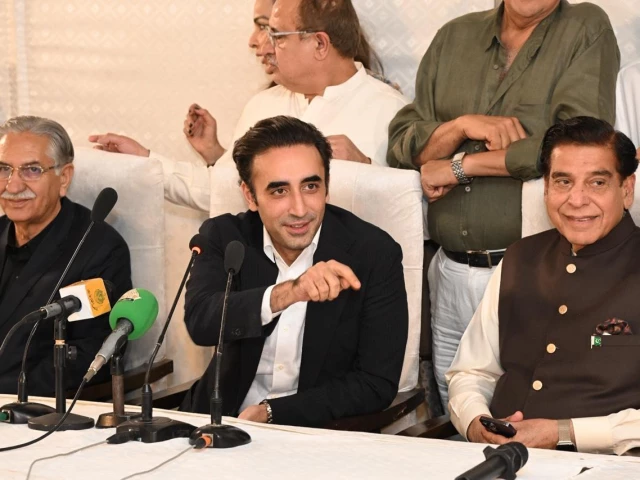Pakistan People’s Party Chairman Bilawal Bhutto Zardari addresses a press conference in Karachi on November 7, 2025. Photo: Express
The Pakistan People’s Party (PPP) has not reached an internal consensus on the government’s proposed constitutional changes related to dual nationality, with its president Bilawal Bhutto Zardari stating that the party is not yet in a position to support or vote on the provision contained in the 27th Constitutional Amendment.
According to a press release issued by Media Cell Bilawal House, Bilawal said: “The CEC meeting could not reach a consensus on some proposals, including those related to dual nationality, Election Commission and executive judiciary. Therefore, I am not in a position at this time to vote or support those constitutional proposals on behalf of my party.”
There have been rounds on X and other social media platforms that the 27th Constitutional Amendment proposes to abolish dual citizenship, requiring Pakistanis who acquire another nationality to renounce their Pakistani citizenship.
🚨 BREAKING NEWS:-
The 27th Constitutional Amendment proposes to abolish dual citizenship, requiring 🇵🇰 Pakistanis who acquire another nationality to renounce their Pakistani citizenship. pic.twitter.com/B8kfJEtyXy
—Asad Nasir (@asadnasir2000) November 6, 2025
Until the amendment is passed, it cannot be officially confirmed whether the policy will apply to all foreign citizens, including overseas Pakistanis, or whether it will be limited to government officials serving in the bureaucracy, or even athletes representing Pakistan on the world stage.
Many senior journalists also expressed their concerns about X regarding that particular clause.
Pakistan’s proposed 27th Amendment would abolish dual citizenship, requiring Pakistanis with foreign nationality to abandon it to retain Pakistani citizenship. The move could have serious implications for Pakistani athletes based abroad who proudly represent the country in…
-Faizan Lakhani (@faizanlakhani) November 7, 2025
The proposed amendment follows a series of recent legislative measures overhauling Pakistan’s dual nationality framework. Earlier this year, the government introduced the Pakistan Citizenship (Amendment) Act, 2024, which allowed Pakistanis to retain their citizenship after acquiring the nationality of 22 designated countries, marking a major change from the previous policy.
Read: Double identity?
Under that amendment, nationals who obtained citizenship from countries such as the United Kingdom, the United States, Canada, Australia, France, Germany and several others in Europe and the Middle East were no longer required to renounce their Pakistani nationality. The move was aimed at simplifying bureaucratic hurdles and easing citizenship complications faced by Pakistanis abroad.
Previously, the government had also moved the Pakistan Citizenship (Amendment) Act, 2024in the National Assembly, which seeks to amend Section 14A of the 1951 Act to facilitate the restoration of citizenship for members of the Pakistani diaspora.
The proposed law would allow people who previously renounced their nationality to reclaim it through a formal declaration once their host country establishes a dual nationality agreement with Pakistan.
It also extends this right to their minor children, aiming to address the difficulties faced by overseas Pakistanis who are forced to renounce their citizenship to acquire a foreign nationality.
However, the latest constitutional proposal goes in the opposite direction: it seeks to abolish dual nationality entirely and requires Pakistanis who acquire another nationality to renounce their Pakistani citizenship.
Read more: Citizenship Law challenged in APS
The change comes amid intense debate over dual loyalty and eligibility for public office. Parliamentary committees have previously argued that having two nationalities conflicts with the oath of loyalty taken by public officials and lawmakers.
The Senate Standing Committee on Cabinet Secretariat, during deliberations on the Public Servants (Amendment) Bill, 2024, highlighted that “it would be impossible for any public servant to be loyal to two countries.”
This broader debate reflects a growing divide in policy direction between those who advocate for diaspora inclusion and those who demand stronger national identity safeguards.




